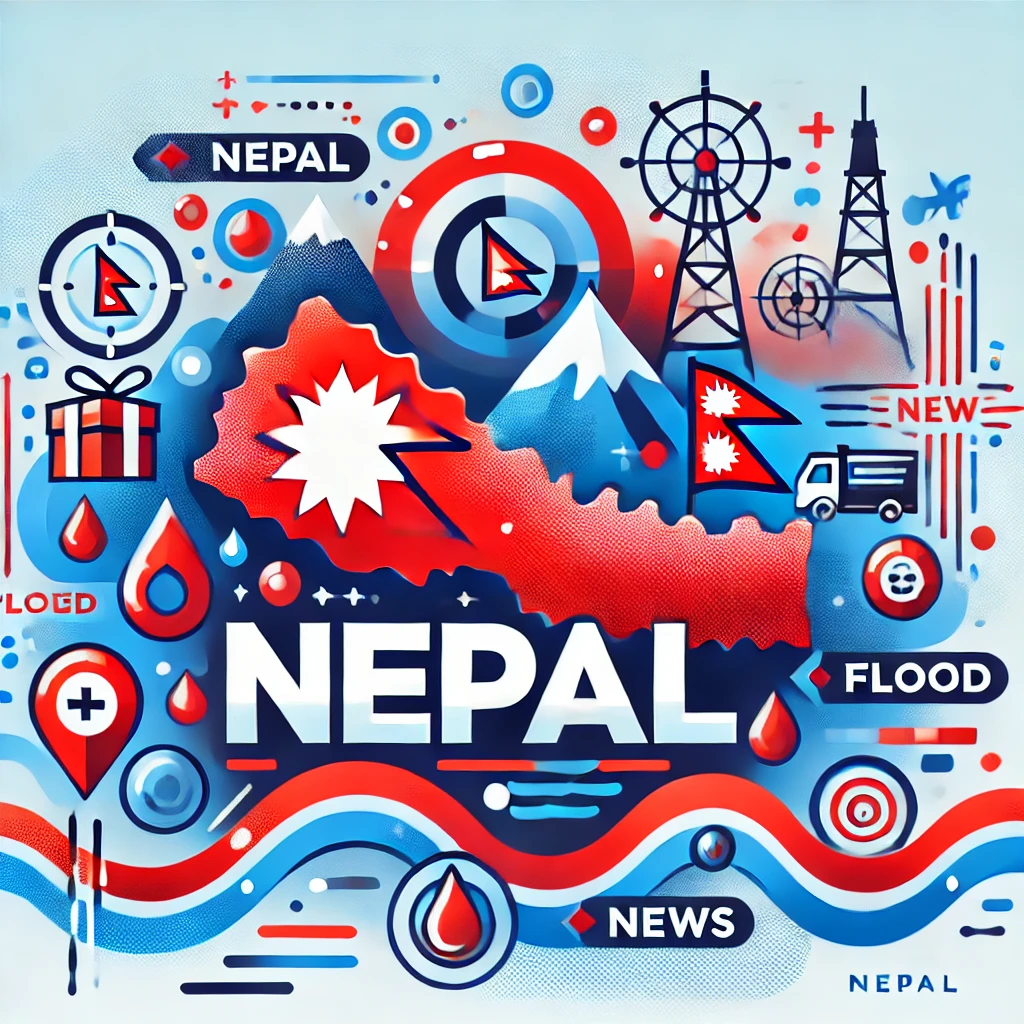News Headlines from Nepal - September 29, 2024

Top 20 News Headlines from Nepal - September 29, 2024
1. Death Toll in Nepal Flooding Reaches 101, Dozens Still Missing
Severe floods caused by continuous monsoon rains have devastated multiple regions in Nepal, claiming 101 lives and leaving 64 people missing. The government has declared a state of emergency in affected areas, with rescue efforts underway despite difficult conditions. Many homes have been destroyed, and infrastructure severely damaged.
2. Kathmandu Inundated as Bagmati River Overflows
After the Bagmati River breached its banks due to heavy rainfall, many areas in Kathmandu were submerged. Emergency services are struggling to manage the situation as rising water levels force thousands to evacuate. Relief efforts are being ramped up as the rains persist.
3. Nepal Declares National Emergency Amid Flood Crisis
The Nepali government has declared a national emergency in flood-affected areas as the death toll continues to rise. The armed forces have been mobilized to assist in rescue and recovery operations. Officials are also coordinating efforts with local NGOs to provide food and shelter to displaced residents.
4. Schools Closed Nationwide After Floods and Landslides
In light of the severe floods and landslides that have affected the country, schools nationwide have been shut down for three days. The decision comes after several areas were rendered inaccessible due to landslides, and many school buildings have been damaged.
5. Koshi River Runs Above Danger Level, Floods Imminent
The Koshi River, which flows through southeastern Nepal, is running at dangerous levels, threatening nearby villages with imminent floods. Residents have been urged to evacuate as authorities prepare for the worst-case scenario.
6. Rescue Operations Underway in Nepal as Landslides Bury Buses
Two buses traveling near Kathmandu were buried by a massive landslide, killing at least 14 people. Rescue operations are ongoing, with teams working to recover bodies and search for survivors trapped in the debris.
7. Flights Canceled Amid Heavy Rainfall in Nepal
Bad weather conditions have forced the cancellation of several domestic flights across Nepal. International flights remain largely unaffected, but delays are expected. Authorities are monitoring the situation closely.
8. Heavy Rain Forecast Continues for Central and Eastern Nepal
The meteorological department has issued warnings for continuous heavy rain across central and eastern Nepal, raising concerns over additional floods and landslides. Residents in vulnerable areas have been advised to evacuate.
9. Over 64 Missing as Search and Rescue Operations Intensify
More than 64 people are missing following floods and landslides across various regions of Nepal. Rescue teams are working tirelessly despite challenging conditions, but hopes of finding survivors are fading as time passes.
10. Villages in Koshi Region Submerged as Water Levels Rise
Several villages in the Koshi region have been completely submerged by rising water levels. Thousands of residents have been displaced, with many now living in temporary shelters provided by the government and NGOs.
11. PM Oli Visits Flood-Hit Regions, Promises Swift Action
Prime Minister KP Sharma Oli visited several flood-affected regions in eastern Nepal and assured residents that the government is taking immediate action to provide relief. He also promised compensation for those who have lost their homes and livelihoods.
12. Landslides Cut Off Key Highways in Nepal
Heavy rains have triggered landslides that have cut off several major highways, including the main route connecting Kathmandu to other regions. Relief efforts have been slowed as transportation remains limited.
13. Nepal Faces Worst Monsoon Flooding in Decades
The ongoing monsoon season has brought some of the worst flooding in decades, with rivers overflowing and extensive damage reported across large parts of Nepal. Experts attribute the worsening floods to climate change.
14. Government Mobilizes Armed Forces for Rescue Operations
The Nepali government has mobilized the Army and Armed Police Force to assist in rescue operations in the most affected areas. Troops are helping evacuate residents and provide emergency aid to flood victims.
15. Local NGOs Provide Aid to Flood Victims in Rural Areas
Several local NGOs have stepped in to provide immediate aid to rural communities affected by the floods. Volunteers are distributing food, water, and medical supplies to those who have been displaced.
16. Nepal's Tourism Sector Braces for Impact of Floods
Nepal’s tourism sector is facing challenges due to the flooding, with popular trekking routes and roads damaged. Hotel bookings have been canceled, and tourism operators are preparing for a slow season.
17. UN Offers Support to Nepal Amid Flood Crisis
The United Nations has offered humanitarian aid to Nepal to help with relief efforts as the country grapples with severe flooding. Supplies and funding will be made available to assist those in need.
18. Health Crisis Looms in Nepal’s Flood-Hit Areas
Health experts are warning of a potential crisis in flood-affected areas, with the risk of waterborne diseases rising due to the lack of clean drinking water. Hospitals are on high alert for outbreaks.
19. Flood Victims Call for More Government Support
Residents in the hardest-hit regions have called for more government support, criticizing the slow pace of relief efforts. Many are still waiting for food, shelter, and clean water days after the floods began.
20. Koshi Barrage Under Stress as Water Levels Peak
The Koshi Barrage is under immense pressure as water levels continue to rise, with authorities warning that a breach could cause widespread devastation. Emergency crews are monitoring the situation closely.
- Nepal_flood_death_toll
- September_29_2024
- Kathmandu_flooding
- Bagmati_River_overflow
- Nepal_state_of_emergency
- Koshi_River_danger_level
- Nepal_landslide_rescue
- Nepal_heavy_rain_forecast
- missing_people_Nepal_floods
- Koshi_region_floods
- PM_Oli_flood_response
- Nepal_highways_blocked_by_landslides
- worst_monsoon_flooding_Nepal
- Nepal_Army_rescue_operations
- Nepal_NGOs_flood_relief
- tourism_sector_impact_Nepal_floods
- UN_support_for_Nepal_floods
- health_crisis_in_flood-hit_Nepal
- government_support_flood_victims
- Koshi_Barrage_stress
- Political Leaders
- Art & Crafts
- Dance & Music
- Sanatan Dharma
- Education & Training
- Food & Drinks
- Gaming
- Health & Fitness
- Home & Gardening
- Literature & Culture
- Love
- Medicine & Ayurveda
- Motors & Vehicles
- Movies & Cinema
- Parenting
- Politics
- Science & Technology
- Shopping
- Social Media
- Spirituality
- Sports
- War & History
- Yoga & Meditation
- Travel & Tourism
- Natural Disaster
- Business & Startups
- DIY & Home Decor
- Finance
- Personal
- News
- Pet Lovers
- Wild Life & Nature
- Podcast & Audio Books
- Poetry
- Law & Order
- Moral Stories
- Jokes & Humour
- Outro


